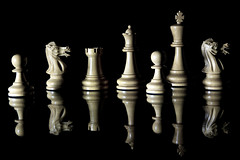In a sentiment that illuminates the psychological machinery behind Nabokov’s famous assertion that “a good reader, a major reader, an active and creative reader is a rereader,” Turchi recounts poet C. Dale Young’s experience of reading and rereading Joseph Conrad’s Heart of Darkness:Read the whole thing. Dear reader, I have a vice, and it’s not pulp SF and splattery horror. (Well, I mean, those are some of them, but not the ones I want to discuss.) I like me a good video game from time to time, as you can probably tell. That’s why I find fascinating Turchi’s insights into the congruities between great stories and good games. Either can make hours move like minutes. With games, Turchi argues this state of flow owes to the interplay between challenge and skill. Too much of the former leads to anxiety, while a surfeit of the latter causes boredom. But when it comes to books, he states, “Most serious poetry and fiction is unlike a game in that it doesn’t intend to become increasingly difficult, but it is like a game in that we want the reader to be engaged and to experience some combination of intrigue, delight, challenge, surprise, provocation, and satisfaction. ... The books that give us the most pleasure, the deepest pleasure, combine uncertainty and satisfaction, tension and release.”“The first time he read it, he said, the book seemed perfectly clear. Why did people make such a fuss? Moved to reread it, he found Conrad’s tale increasingly elusive, more complicated. Richer. However it happens, the appeal of the books we return to is often, at least in part, a fascination with what we can’t quite reach.”This notion of the elusive, Turchi goes on to argue, is essential to the alchemy of storytelling. Turning to pioneering psychologist Mihaly Csikszentmihalyi’s seminal work on flow -- that state of intense focus and crisp sense of clarity where you forget yourself, lose track of time, and feel like you’re part of something larger -- Turchi explores the role of challenge in the “flow channel” of narrative. ...
He cites game designer and Carnegie Mellon professor Jesse Schell’s book The Art of Game Design, which identifies the four elements necessary to put a game player (and, by extension, a reader) into a fruitful “flow state”:1. clear goalsThe last one, Turchi argues, is of especially delicate balance.
2. no distractions
3. direct feedback
4. continuous challenge
Of course, stories can increasingly challenge us. We simply don’t notice it at first. During an initial reading, we’re just peeling back the outer layer of plot. The best books, though, give us a reason to read again, and during that process, we sift through the strata of symbol and metaphor, character and theme, setting and style. And contra Turchi, such books needn’t necessarily be serious. There’s no natural divide between complexity and delight.
(Picture: CC 2012 by Adrian Askew; Hat Tip: @JRVogt)



2 comments:
Late comment here, but I really like this comparison between games and literature both trying to hit that sweet spot between heavy engagement and passive engagement, so to speak. That resonates with my experience of both.
A somewhat-on-topic contribution: I have read in several places Sid Meier talking about his philosophy of game design, and it largely revolves around hitting that spot where you're just engaged enough to be challenged and having fun, but not so challenged that the game begins to feel like work rather than play. I believe that the play component of video games derives a lot of its pleasure from how it simulates work as God created it to be, with less effect of the fall upon the necessity of doing work not to starve, the difficulty of work in a corrupted world, etc., which Meier's comment lines up with nicely. It's early on a Monday and this might be a tangent, but, there's some food for thought.
Sounds like Sid Meier is exactly right, and your thoughts are similarly stimulating. I know the current trend in gaming is to really emphasize difficulty, but if I'm going to work, I want it to be on something with lasting impact. I noped out of Dark Souls after about an hour. (It didn't help that it ran like a slug slinking through molasses.) But something like Dishonored that threads the needle of challenge I could totally go for; it doesn't hurt that there's more than a little grace in the "good" ending. Also, Team Fortress 2 oscillates perfectly between that band of too-easy and too-hard -- a little bit too much so!
Post a Comment